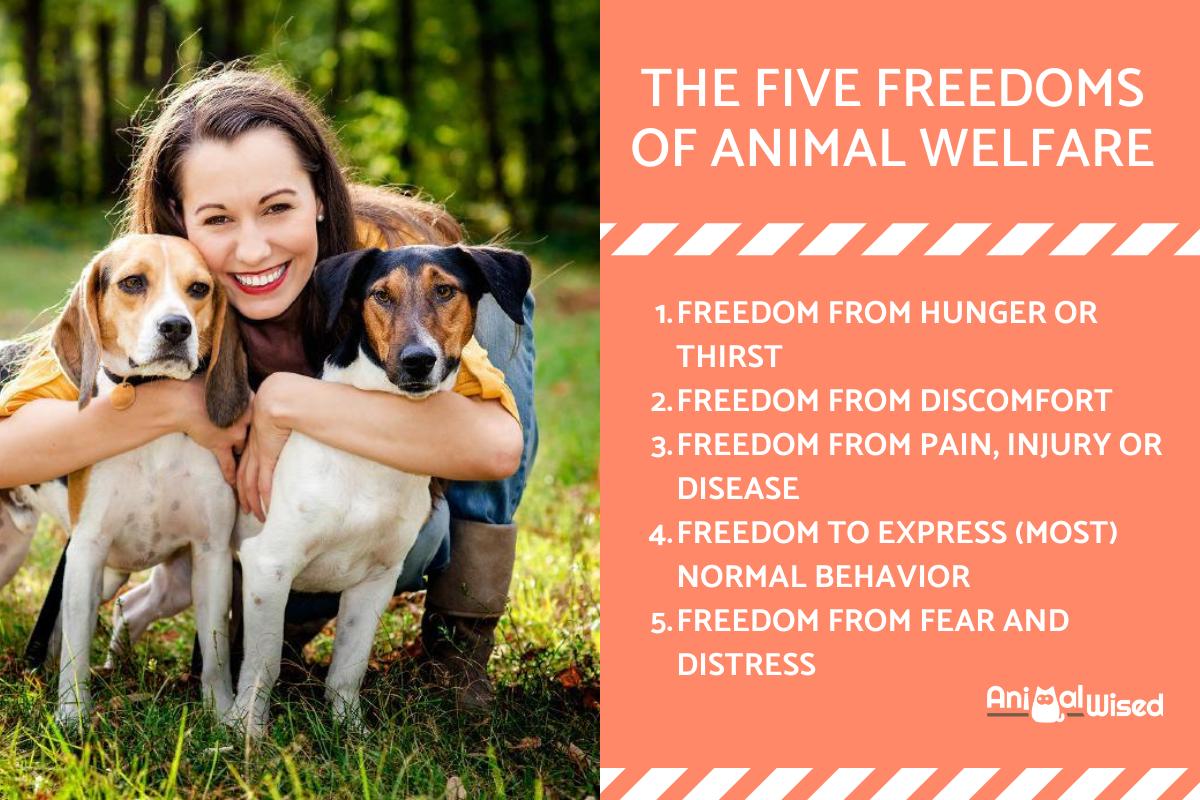The Five Freedoms of Animal Welfare


Humans have rights according to international human rights law (IHRL), even if they are upheld differently depending on where you live. These rights grant us some basic protections from harm and are useful when making policy decisions on how we are treated. You may not be aware that animals have similar rights. Although they are not law in most countries in the same way as IHRL, the 5 freedoms are a helpful guide to establishing how animals are protected from harm in a society. These protections must extend to domestic animals and can be a helpful reminder that we have a responsibility of care for our pets.
At AnimalWised, we look at the Five Freedoms of animal welfare. In doing so, we might be able to look at our own companion animals and see if we are neglecting any of their basic care needs.
Why are there 5 freedoms of animal welfare?
As stated in the introduction, we have certain rights for humans. While historically we have often treated animals as objects, many of us are working towards a greater respect for animals. Treating them in a humane way should be a priority for industry, as well as for the domestic environment. This has led various initiatives to try to introduce some type of formal recognition of animal rights.
There is a specific reason why the 5 Freedoms were initially introduced. In 1965, the United Kingdom released a report on animal husbandry which shocked many. This was a review of farming practices which showed that many animals suffered abuse and were installed in inappropriate conditions. Its leader, Roger Brambell, reported that “[a]n animal should at least have sufficient freedom of movement to be able without difficulty, to turn round, groom Itself, get up, lie down and stretch its limbs.”
Eventually, the report's findings led to the formation of the Farm Animal Welfare Council (FAWC), a committee designed to review the welfare of animals on farmland, as well as in transit and in place of slaughter. Taking the seed of Brambell's initial five freedoms, the list was revised and officialized in 1979. It resulted in the Five Freedoms of animal welfare.
If you work in the agricultural industry, you should be aware of these freedoms and work to the very specific legislation of your particular region. However, the 5 Freedoms of animal welfare also translate to pet owners. If you are an animal guardian, we show you what are the Five Freedoms and how they apply to caring for your companion animal.
1. Freedom form from thirst, hunger and malnutrition
Freedom from hunger or thirst by ready access to fresh water and a diet to maintain full health and vigor.
Water should always be available for your pet, including at night, even when you are sleeping. Especially if you live somewhere cold, you must ensure that the top layer of water has not frozen over. To avoid this, you should place it inside the home or near an appropriate heat source.
In terms of food, it is important to know what is the best diet for your individual dog. Regardless of your pet's specific needs, you should ensure their feed is of high quality. If our animal has any health issues, we need to ensure we provide a diet which can support them. The first of the 5 Freedoms does not mean you can give them whatever they want. Too much rich food can cause obesity and other issues, so it is important we provide for them correctly.

2. Freedom from discomfort
Freedom from discomfort by providing an appropriate environment including shelter and a comfortable resting area.
Comfort is something basic that depends directly on your pet's given environment. This includes having a comfortable bed in which they can relax and unwind. This will also be specific to your animal's needs. For example, a Greyhound has a bony structure so they will need more padding than other breeds. We also need to ensure they live at a stable temperature and are protected from the elements.
As your animal ages, their comfort needs change. For example, older dogs and cats will need less exercise and more protection over their joints and other body issues.
3. Free from pain, injury or disease
Freedom from pain, injury or disease by prevention or rapid diagnosis and treatment.
You cannot claim to have a pet that meets the five freedoms if they suffer an illness or disease and you do nothing about it. When our dog is injured or contracts an illness, we need to take them for veterinary treatment. Disease and harm prevention are also important. We should never put them in a situation which is likely to cause them harm and we need to establish suitable vaccination and deworming schedules.
Freedom from pain is also important in how we treat our animals. We cannot physically abuse them and cause them harm. Cruelty to animals is illegal in most countries, but it still happens. The reason why the Five Freedoms of animal welfare in the first place is to prevent instances of such abuse.
4. Free to express (most) normal behavior
Freedom to express (most) normal behavior by providing sufficient space, proper facilities and company of the animal's own kind.
Companion animals must be able to express themselves freely in the environment in which they live. For that reason it is essential to have good communication with your pet and know what they need:
- Let them explore and sniff around: allowing them to adapt to the environment in which they live, identify pets living nearby, find a particular place, perform their daily tasks (as they would in nature), etc.
- Activity: it is very important your animal can exercise all they need. This will help your dog maintain a balanced character, stay healthy, avoid stress and engage them both cognitively and physically.
- Bonding with family: animals such as dogs that have spent their entire life with people want contact with them. Socialization for puppies and adult dogs is important as it make them feel part of a family, As a social animal, neglecting these aspects of their care can lead to serious behavioral issues, as well as anxiety and/or depression.
- Contact with other animals: if your pet has lived with others of their kind, they can become depressed when alone and bored. This will depend on the animal species.
The 5 Freedoms use the word ‘most’ to distinguish between healthy expression of behaviors and that which can cause harm. We use training and education to help our companion animals behave and respect boundaries when living in the domestic environment. Doing so benefits everyone, so it is important to never neglect this aspect of their care.

5. Freedom from fear and stress
Freedom from fear and distress by ensuring conditions and treatment which avoid mental suffering.
Finally, to bring the Five Freedoms of animal welfare to an end, we must ensure that our dog suffers no fear or stress. This is the most difficult of the 5 Freedoms, simply because it is often difficult to know how a pet will respond to certain stimuli. For this reason, we must do everything we can to ensure their wellbeing. Some basics include:
- Do not force your pet to interact if they do not want to
- Reward calm and tranquility
- Never punish your pet physically
- Teach your pet to understand basic commands
- Always use positive reinforcement
- Do not create situations that put your pet through undue stress
- Identify your pet's fears and help them to overcome them
If you fear you are unable to meet the Five Freedoms of animal welfare, it means you are causing harm to your companion animal. An ethologist can help you to assess your animal's needs, as well as your own approach to their care. If you still cannot meet these basic principles of animal welfare, you will need to forfeit your guardianship and let your animal live somewhere which is able to do so.
If you want to read similar articles to The Five Freedoms of Animal Welfare, we recommend you visit our Basic education category.








